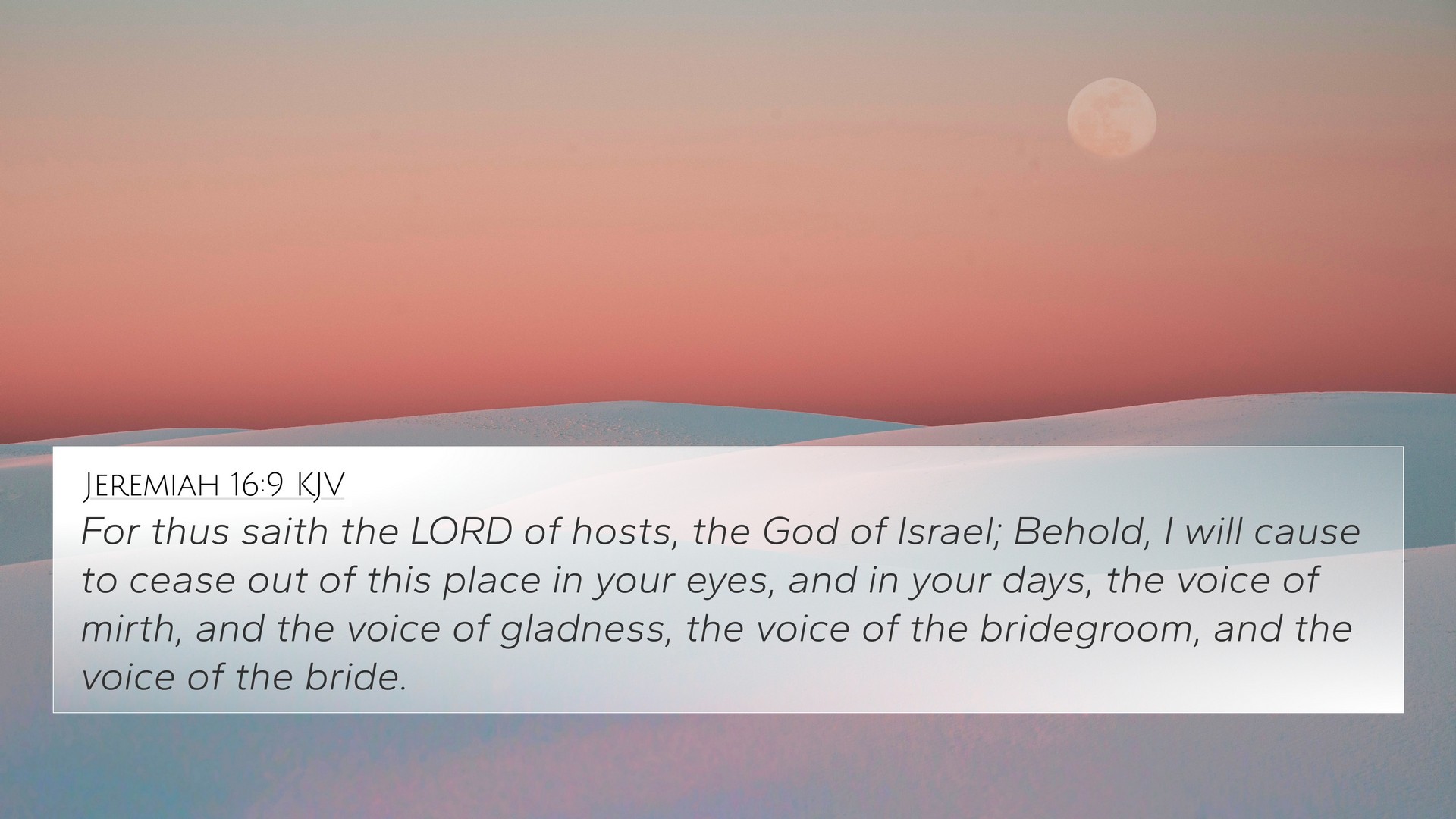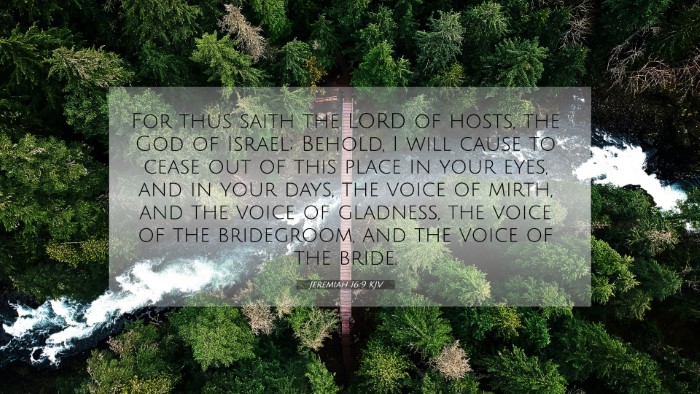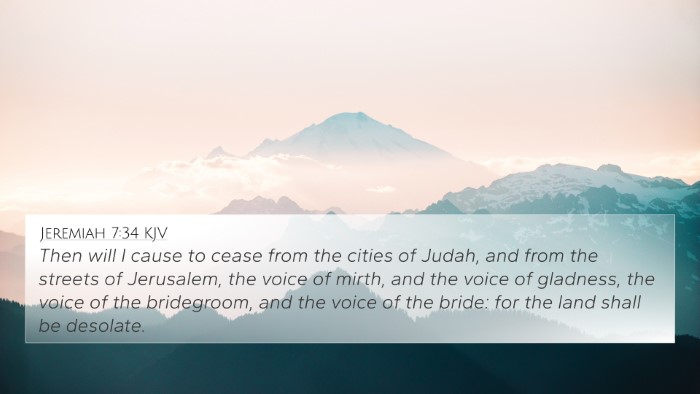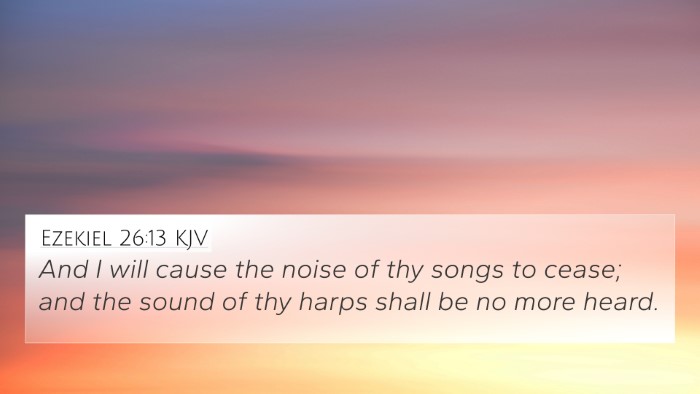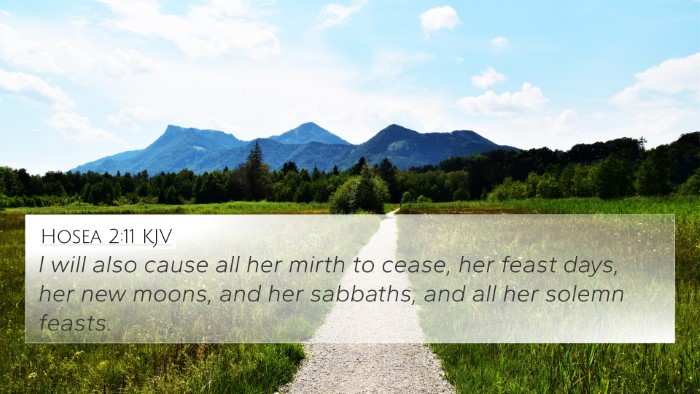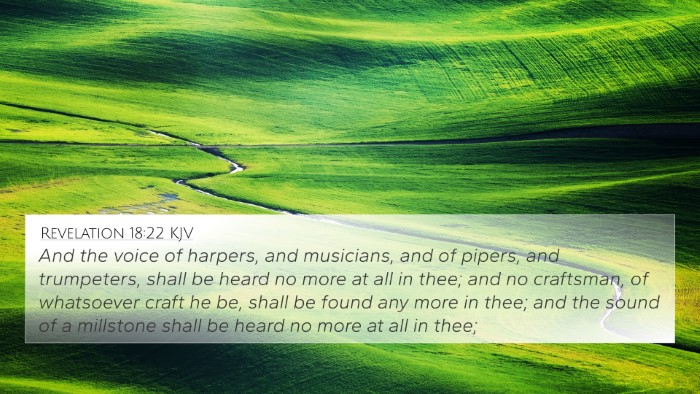Understanding Jeremiah 16:9
Verse: Jeremiah 16:9 - "For thus saith the LORD of hosts, the God of Israel; Behold, I will cause to cease out of this place in your eyes, and in your days, the voice of mirth, and the voice of gladness, the voice of the bridegroom, and the voice of the bride."
Meaning and Interpretation
The verse from Jeremiah 16:9 is a profound statement about the coming judgment from God upon the people of Israel. Through various commentaries, the following insights can be gleaned:
- Matthew Henry: Henry emphasizes that this declaration serves as a warning of divine judgment. The cessation of joy and celebration signifies a time when God's displeasure results in the removal of happiness from the land. It paints a picture of a future where the usual festivities and rites of life, such as weddings (symbols of joy), will be replaced with sorrow.
- Albert Barnes: Barnes outlines that the phrase "voice of mirth" references the lively expressions of joy that were customary in the community. He interprets this verse as a call to repentance. The absence of joy indicates a significant loss for the people, reinforcing that spiritual and moral decay leads to tangible consequences in their social lives.
- Adam Clarke: Clarke proposes that the specific mention of both the bride and bridegroom accentuates the totality of the impending sorrow. His commentary draws a connection between personal relationships and communal grief, implying that the breakdown of joy in family structures reflects deeper societal issues.
Cross-References
This verse correlates with several other passages in the Bible, revealing thematic connections. Here are 10 related verses that enhance the understanding of Jeremiah 16:9:
- Isaiah 24:7-11 - This passage describes the end of joy and the destruction of the earth, echoing the themes of mourning and loss found in Jeremiah.
- Lamentations 5:15 - Here, the speaker laments the absence of joy, offering a parallel sentiment to Jeremiah's words regarding the cessation of gladness.
- Matthew 22:2-3 - The parable of the wedding feast relates to the joy of marriage, contrasting sharply with Jeremiah's mention of the bride and bridegroom in a time of sorrow.
- Revelation 18:22-23 - This passage discusses the fall of Babylon, mentioning the end of music and joy, mirroring the themes of loss outlined in Jeremiah 16:9.
- Ezekiel 26:13 - Ezekiel prophecies the destruction leading to silence in the places of joy, which resonates with Jeremiah's message.
- Amos 8:10 - In this verse, Amos speaks of turning feasts into mourning, reflecting the prophetic warnings of loss of joy.
- Zephaniah 1:10 - This verse describes a cry of anguish in the streets, reinforcing Jeremiah’s depiction of sorrow and mourning.
- Matthew 9:15 - Jesus refers to the time when the bridegroom will be taken away, leading to mourning, connecting to Jeremiah’s prediction.
- Psalm 137:1-4 - The lament of Israel in captivity echoes the feelings of loss described in Jeremiah's prophecy about the voice of gladness ceasing.
- Hosea 2:11 - This passage mentions the ceasing of joy and festivities, providing another layer of context regarding Israel's loss of divine favor.
Thematic Connections
This verse invokes broader themes present throughout the Bible:
- Judgment: The theme of divine judgment is prevalent in the prophetic books, highlighting the inevitable consequences of turning away from God.
- Loss of Joy: The cessation of joy is a recurrent motif, often linked with national calamity or spiritual decay.
- Repentance: Many cross-referenced verses encourage turning back to God to restore joy and gladness in one's life.
- Hope and Restoration: Despite the somber warnings, many verses also foretell eventual restoration, reinforcing God's love and promises.
Tools for Bible Cross-Referencing
Understanding the connections in Scripture can be enhanced with a variety of tools:
- Bible Concordance: A valuable resource for finding related verses and their meanings.
- Bible Cross-Reference Guide: These guides provide quick references to related passages, aiding in deeper study.
- Cross-Reference Bible Study: Engaging in this method allows for a comparative analysis of themes and contexts across various scriptures.
- Bible Reference Resources: Comprehensive materials available that can assist in studying inter-connected Biblical texts.
Conclusion
Jeremiah 16:9 serves as a powerful reminder of the consequences of societal and spiritual neglect. By utilizing tools for cross-referencing and understanding related themes throughout scripture, the depth and richness of this verse can be fully appreciated. In this way, believers are called to reflect on their lives, recognizing the need for repentance and the hope for renewal.
